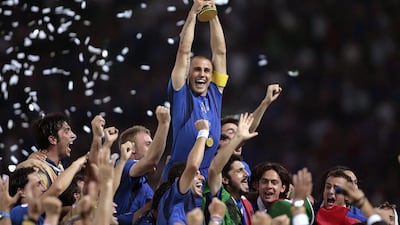As Fabio Cannavaro attests, winning the World Cup has a transformative effect. It raises you to a rarefied existence.
“It’s something incredible, crazy, unbelievable,“ says the Italian, who, as captain, guided his country to the 2006 title.
"When you win the World Cup, you're not a normal player any more. You become a legend."
For more World Cup stories, visit our dedicated microsite – thenational.ae/worldcup.
Cannavaro’s status was secured eight years ago at the Olympic Stadium in Berlin, Germany.
There, his side outlasted France in the final, triumphing on penalties after a 1-1 draw and that Zinedine Zidane head butt. Italy had a fourth world crown; Cannavaro, his crowning moment.
“Family and health is everything for me,” he says, “but the feeling of captaining your country to the title is indescribable.
“It never goes away for as long as I live. Everywhere, every place you go, people remember you won the World Cup. I am very proud, because to win the World Cup, it is ‘wow’.”
Italy's triumph certainly was. Marcello Lippi's men had come into the tournament on the back of the Calciopoli scandal that rocked Italian football, with Serie A's leading clubs investigated for match-fixing. It included Cannavaro's Juventus.
Distractions and disruptions abounded, but the Italians resolved to use the controversy as a catalyst. Nobody else may have given them a chance, so what did Italy believe they could achieve?
“To win it,” Cannavaro says.
Calciopoli hurt, but it galvanised, too.
“As professionals, we stuck to the task of preparing for the tournament and wanting to deliver at the top level,” he says. “Which we did.”
Yet the road to the final was pockmarked by problems. In the second group game, against the United States, Daniele De Rossi elbowed Brian McBride and was sent off. He was banned for four matches, ruling him out of every game until the final – if Italy made the final.
In the following fixture, Alessandro Nesta, Cannavaro’s trusted defensive partner, injured his groin. His tournament was over.
Still, Italy topped the group, but Nesta’s replacement, Marco Materazzi, was dismissed in the last-16 encounter with Australia. Down to 10 men, Francesco Totti’s injury-time penalty ensured progress.
Despite the setbacks, Italy had strode forward.
“Strength in depth is key and we had such a talented and strong squad, with no weaknesses,” Cannavaro says. “We were so motivated anyway. The further into the tournament we went, the closer we became, so whoever was playing, the others were as supportive.
“We adapted and kept to our game plan, and it worked.”
Ukraine were defeated in the quarter-finals and a clash with Germany, the hosts, was set. It was in Dortmund that Italy’s improbable run was supposed to meet its end, but Fabio Grosso and Alessandro Del Piero struck in the closing minutes of extra time.
Italy advanced 2-0. Cannavaro had been instrumental and was voted man of the match.
“It was tough,” he says. “Playing the hosts and their extra supporters meant we had to bring everything and leave it all on the pitch. We did – it was all of us.”
At the final, Italy’s indomitable team spirit again proved decisive. They had surprised throughout the tournament, but France were expected to become world champions for a second time in eight years. After all, they had Zidane.
As 70,000 packed the Olympic Stadium, Cannavaro remained just as he had for most of the finals: cool as ice.
“I was relaxed,” he says. “It was every boy’s dream, so I wanted to savour every moment.
“The coach prepared us with the tactics and the inspiration from all of us was there. Those were quality moments in the changing room. I loved every second of it.”
The French threatened to sour the moment when Zidane struck from the penalty spot on seven minutes.
Materazzi levelled soon after, and a pulsating final continued until Zidane supplied the tournament’s defining moment: deep into extra time, he rammed his head into Materazzi’s chest.
He was sent off, later revealing Materazzi had insulted his mother.
“We didn’t really know what was happening,” Cannavaro says. “All I knew was Materazzi was on the floor, but I was so focused. I just wanted to keep to our game plan.”
Game plan executed, during the shoot-out Cannavaro stood motionless with arms crossed, as one by one his compatriots took the long walk from the centre circle to the penalty spot.
Andrea Pirlo, Materazzi, De Rossi, Del Piero, Grosso. Italy’s fantastic five. They all scored and David Trezeguet missed. Italy had a fourth World Cup.
Like throughout the tournament – Italy conceded two goals in Germany – in the final Cannavaro had been a rock.
Supporters labelled him “Muro di Berlino” (The Berlin Wall). It was an undivided opinion, reinforced by being named World Player of the Year later in 2006.
So, despite Calciopoli, the controversy and the complications, Italy’s cohesion had lifted them above and beyond. They had become legends together.
“I’m proud, very proud, but I needed my teammates,” Cannavaro says. “It was a collective effort. I can only take credit as much as the other members of the squad. We were one.”
jmcauley@thenational.ae
Follow us on Twitter at @SprtNationalUAE


